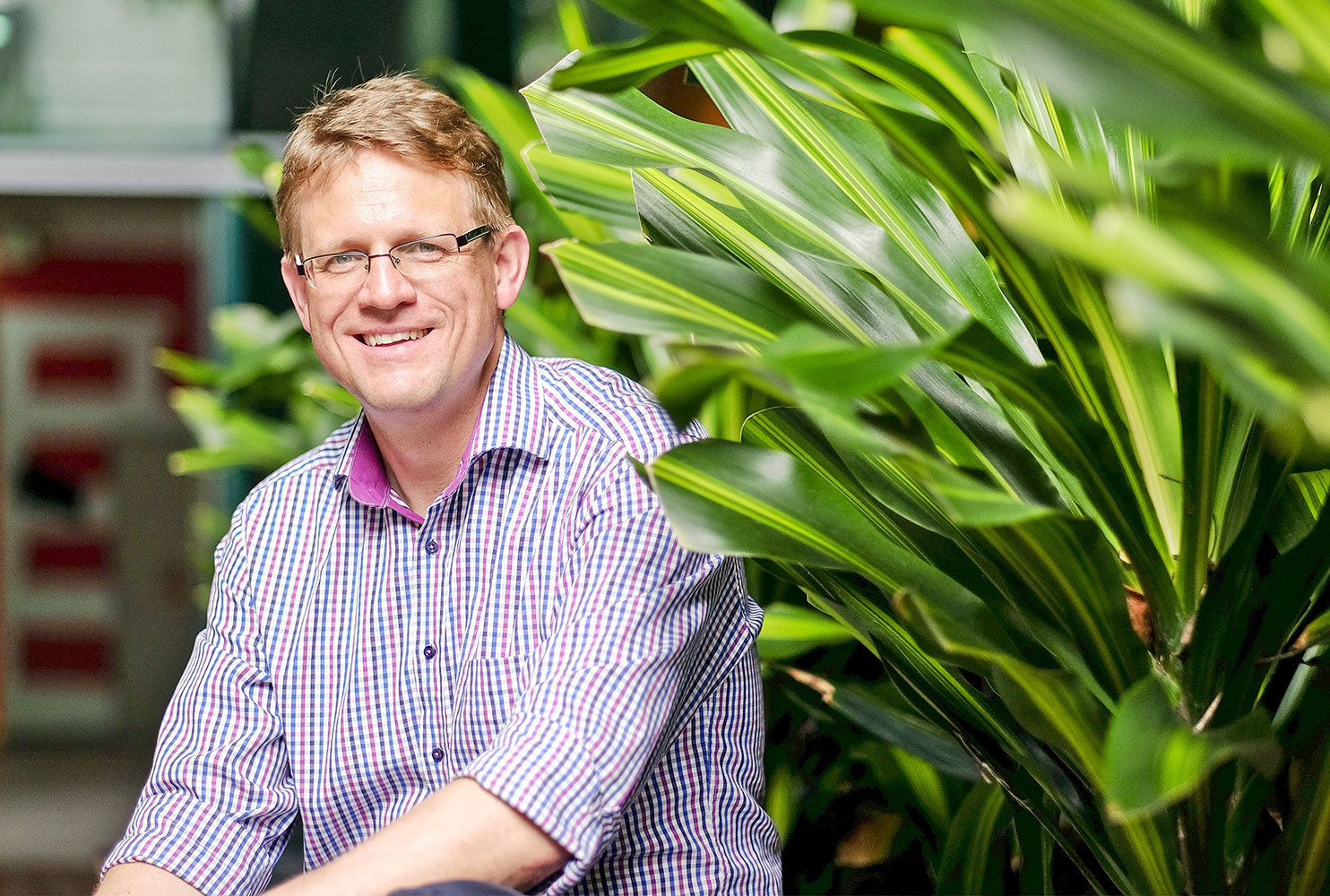
As a teenager in Germany, Jochen Reb found himself interested in Eastern philosophy. Later, while pursuing his diploma, he spent a year as a graduate exchange student in Japan.
This fuelled a growing personal interest in meditation and he would go on to study mindfulness, then a rather new-fangled concept, and note the similarities between Zen meditation and mindfulness meditation for stress reduction.
He eventually did some business-related research on topics such as mindfulness and negotiations and started presenting his work at conferences. Initially, he stood out as one of a select group of researchers in this field, getting lukewarm or even negative responses.
“[Research in mindfulness] was very rare. Hardly anyone was doing it [in the early 2000s]. Other delegates wouldn’t publicly admit their interest, but some would come to me afterwards and tell me, secretly, that they had been meditating or had found the topic very interesting.”
Today, the landscape has changed significantly in this field of research and he is now the Director of Mindfulness Initiative @ SMU, and also Professor of Organisational Behaviour and Human Resources at the Lee Kong Chian School of Business.
Mindfulness is a mainstream concept these days, one which Professor Reb characterises as a form of self-regulation of one’s attention, and one that has entered the corporate realm. Some firms have even organised mindfulness sessions to bolster their employees’ mental health.
Professor Reb, 47, first got the idea to study mindfulness, which is often defined these days with words such as “conscious”, “aware” and “present”, in relation to business when he was a PhD candidate at the University of Arizona.
“I did my PhD [in Management, focusing on] decision-making and regret aversion. I also took some courses in psychology there and I realised some people in the psychology department were studying mindfulness there,” he said. “I came across the research and thought it would be interesting to look at it in a business context.”
One notable paper was on mindful leadership, titled “Leading mindfully: Two studies on the influence of supervisor trait mindfulness on employee well-being and performance”, published in 2014 in the journal Mindfulness.
“I think that’s memorable because it was really the first quantitative study on leader mindfulness and how it influences or relates to employees’ experiences,” he explains. “At that time, not much mindfulness-in-the-workplace research was going on, especially not about leadership.”
It was known then that being more mindful benefited individuals, making them less stressed and anxious. Such individuals could also experience less exhaustion or burnout as an employee. However, the paper examined the hitherto-unasked question of whether some people (employees) could benefit from the mindfulness of others (a leader).
“People do mindfulness for a lot of very selfish reasons, it’s [considered] kind of this self-improvement thing, right?” he says. “It’s kind of ironic, because it’s not. At least that’s not how I understand mindfulness.”
“The idea was to show that mindfulness can benefit other people – it’s not just something we do for ourselves. It can benefit communities and organisations. So I quite liked this paper, as it was really the first one to look at leader mindfulness empirically,” he added.
More recently, he co-edited a special issue on “Mindfulness arrives at work: Deepening our understanding of mindfulness in organizations”, in the journal Organizational Behavior and Human Decision Processes, for which he and his co-editors wrote the introductory article.
And he has a paper published in the Human Relations journal, titled “Examining mindful self- regulated attention and political skills as antecedents of leader authenticity and leadership effectiveness.”
Looking back on how the perspective on mindfulness has changed dramatically in scholastic circles over the years, Professor Reb shared the kinds of pushback he received at his early conference presentations.
“Some people thought mindfulness was a religious or esoteric subject and were adamant that these elements shouldn’t be brought into science. While others who associated mindfulness with Buddhism didn’t like it being presented in what they considered a superficial or simplistic way. Fortunately, it’s totally different now,” he said.
Despite having a research focus, the Mindfulness Initiative at LKCSB also supports education and outreach, offering open-enrolment courses such as mindfulness-based stress reduction (MBSR) and mindfulness-based strategic awareness training (MBSAT), which is centred on decision-making.
This came about after Professor Reb felt that it would be nice to share research findings and bring more people with a common interest together.
“Yeah, I can do research on [mindfulness], I can publish papers on it, and people can read these papers. But, really, you have to practice it in order to experience it. You can’ t really experience mindfulness by reading about it. You may know the definition, but that doesn’t mean you know what
mindfulness really is.”
Apart from teaching courses as part of the Mindfulness Initiative, Professor Reb teaches at both undergraduate and postgraduate levels at LKCSB. This includes an undergraduate course on the psychology of managerial decision-making and another on negotiation and conflict resolution.
For PhD candidates, he teaches a course on behavioural research methods, a course on decision- making in leadership and an advanced research topics seminar on decision-making, mindfulness and sustainability. He also teaches in the Master of Human Capital Leadership programme.
While he still practices meditation and mindfulness, the father of two teenage boys and classical music lover has recently turned to taking long walks to discover more of Singapore and maintain his physical and mental well-being.
“Even though I have been living in Singapore for so long, there are many areas that I don’t know so I’ve been going on walks,” he said. “Not just in the nature areas like the parks but just walking through town sometimes. It’s good exercise and it’s fun to explore.”